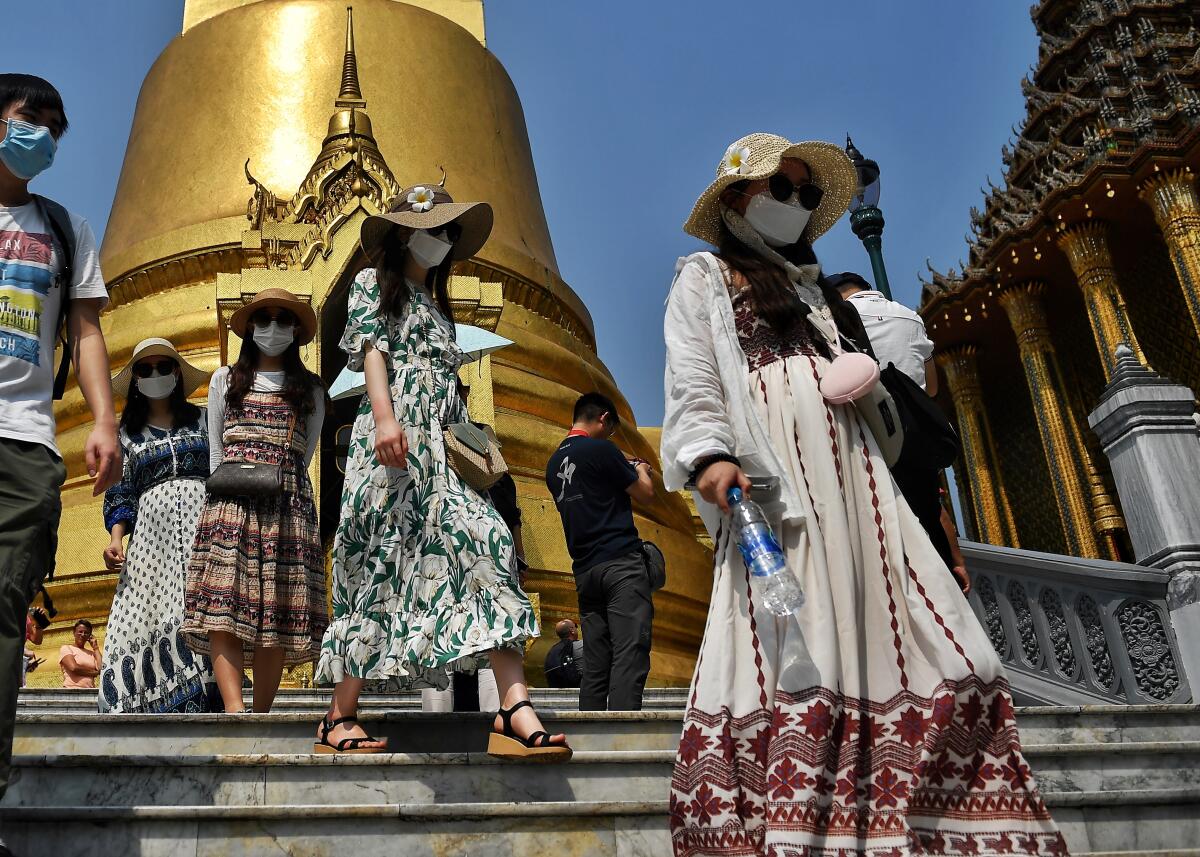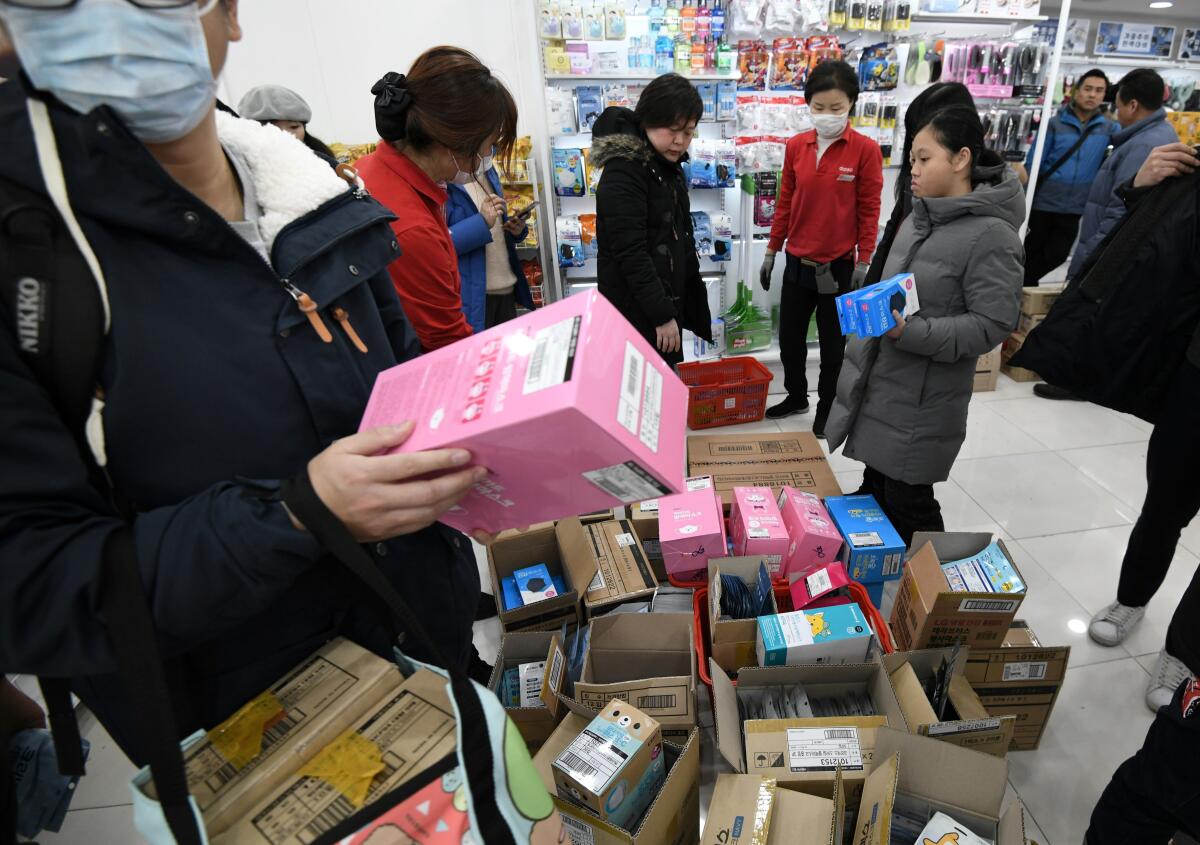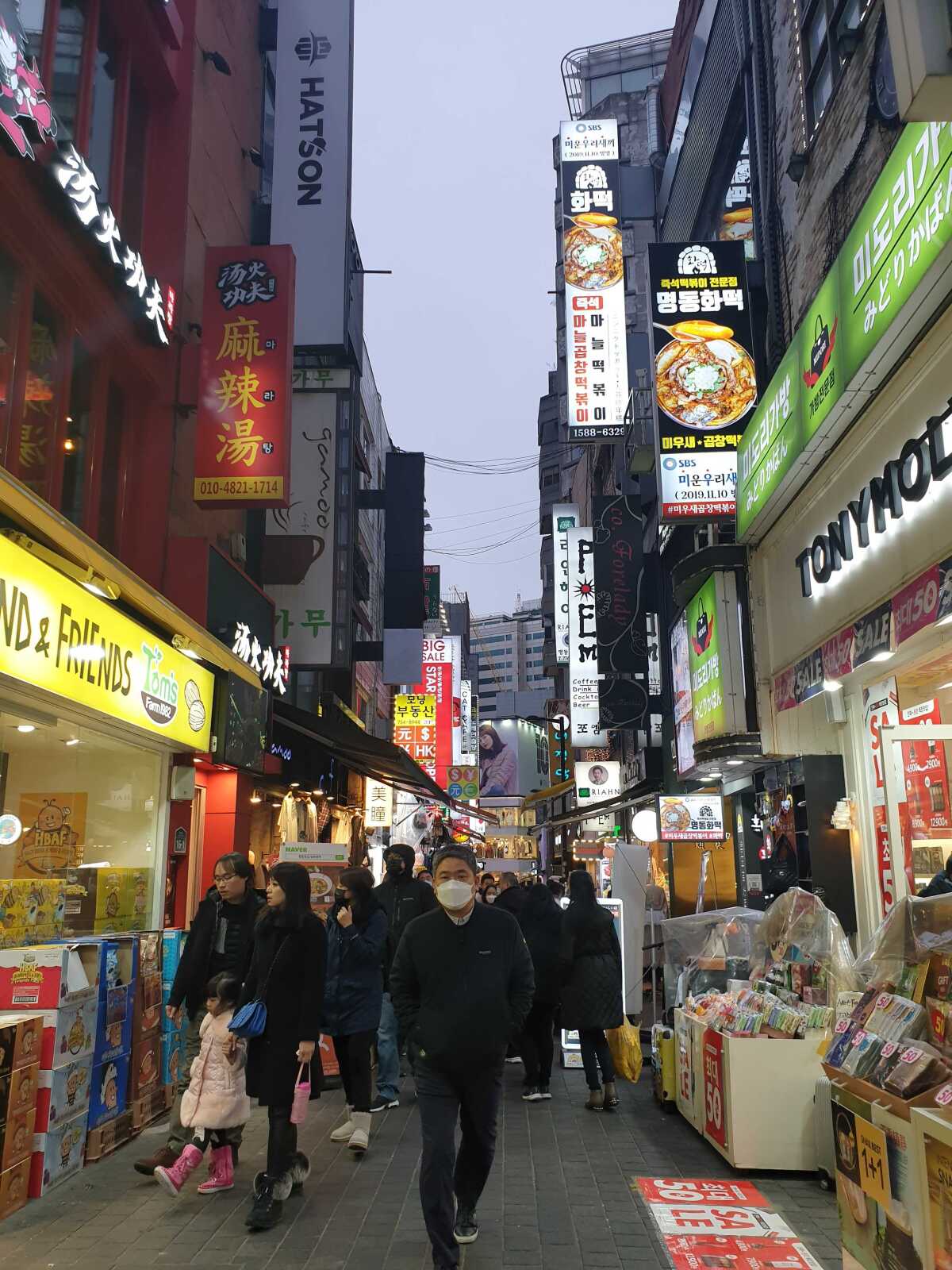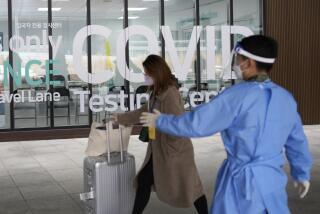‘No Chinese’: In petitions, signs and tweets, fear is spreading faster than the coronavirus

- Share via
SEOUL — When some 5,000 Chinese travelers arrived in South Korea earlier this month for a company retreat, local officials rolled out a red carpet, handed them bouquets and renamed a city street after the health food firm they worked for.
In recent days, however, Chinese tourists have received a different kind of greeting, as fears rise over the global spread of the deadly coronavirus that originated in the Chinese city of Wuhan.
More than 600,000 South Koreans have signed an online petition asking that Chinese nationals be banned from entering their country. In Malaysia, more than 400,000 have signed a similar petition. Mongolia and North Korea, meanwhile, have each sealed their borders to Chinese travelers, and the Philippines has stopped issuing visas on arrival for the Chinese.
“Even North Korea is banning Chinese from entering,” the South Korean petition read. “It’ll be too late after it reaches our shores. Preemptive measures are necessary.”

Like many of its Asian neighbors, South and North Korea are heavily dependent on Chinese tourists and their fast-increasing spending power. The health company tour group alone, officials in the west coast city of Incheon estimated, would bring in nearly $20 million in unspecified economic gains.
The widespread fears come in spite of the fact that most public health officials generally advise against travel restrictions because of the potential to cause more harm -- by hindering medical personnel, breeding a false sense of security and motivating people to skirt any bans, making infections much harder to track. Studies on the efficacy of such travel bans in the past have concluded they only briefly delayed but were ultimately unable to stop the spread of epidemics, that the costs outweighed any benefits, and that they may have in fact exacerbated the global crisis.
China’s own dramatic measures to contain the virus — quarantining people within the most heavily infected areas and, beginning earlier this week, suspending all outbound group tours — do not appear to have lowered concerns in countries where the Chinese have been traveling in large numbers.
Moreover, travel into China is now being strongly frowned upon. The U.S. State Department on Thursday issued a Level 4 “Do Not Travel” alert on China — the highest-level warning, also in place for conflict zones including Syria and Afghanistan. The Centers for Disease Control and Prevention also urged no nonessential travel to the country.
And on Friday, Delta Air Lines and American Airlines announced they would halt all flights between the U.S. and China.
The coronavirus, which has spread to 18 countries and caused more than 200 deaths, is the first outbreak originating in China since the 2003 SARS epidemic, which began in southern China. Back then, 16 million Chinese tourists went abroad a year; by 2018, as China’s middle class mushroomed and with many countries easing visa restrictions to attract its travelers, the number increased more than tenfold to 162 million. Chinese spending overseas has far eclipsed that of travelers from other countries, lavishing the world with almost double what Americans spent abroad.
The rapid surge has meant a particularly dramatic increase of Chinese tourists in nearby Asian countries, and businesses and governments have been eager to cater to them. The alarm since the outbreak over any and all Chinese, irrespective of whether they are from the heavily affected areas or are showing symptoms, has been fiercest in some of the destinations most dependent on tourism from China.
Restaurants and retailers in Korea and Japan, in which the Chinese account for a third of all tourists, have posted signs on their storefronts saying “No Chinese Allowed.” An Indonesian governor was pilloried online after a video showed him personally greeting a Chinese tour group at the airport; no matter that the group came from a city nearly a thousand miles away from Wuhan, far from the center of the outbreak. Malaysian media widely reported a Chinese couple’s arrest after they had allegedly sneaked their child out of quarantine at a hospital despite showing symptoms; a video clip of their detention at the airport has gone viral.
Even some fans of the hugely popular K-pop group BTS took to Twitter to suggest Chinese nationals should be prohibited from the boy band’s concert in Seoul scheduled for April, out of coronavirus concerns.
The leaders of South Korea’s main opposition party Tuesday urged the government to institute a ban on travel from China.
South Korea’s President Moon Jae-in on Thursday cautioned against succumbing to “fear and hatred” surrounding the epidemic. “We’re not only up against the virus. We also need to stand firm against excessive anxiety and vague fears,” he said.
In the U.S. in 2014, several dozen members of Congress urged the Obama administration to impose bans on travel from three West African nations plagued by Ebola. No ban was enacted after public health officials and medical experts argued against it and urged calm.
“It’s only human to want to protect ourselves and our families,” Tom Frieden, then-director of the U.S. Centers for Disease Control and Prevention, wrote at the time. “But, as has been said, for every complex problem, there’s a solution that’s quick, simple, and wrong. A travel ban is not the right answer.”
Ebola is transmitted between humans through direct contact with blood or bodily fluids. While the new virus is still being studied, similar coronaviruses in the past have spread through respiratory droplets released into the air when those infected sneeze or cough.

This week in Myeongdong, a shopping district in central Seoul popular with Chinese tourists, Chinese-language signs advertised hair treatments, beauty products and street food. A line snaked out the door of a pharmacy selling face masks; next door, a shop hawking K-pop albums and goods sat deserted. Cosmetics stores prominently displayed buy-one, get-one-free bottles of hand sanitizer in their shop windows.
With efforts mounting to curtail travel, some businessmen were expressing concerns about their bottom line.
Clothing boutique operator Lee Hee-sook, 55, has weathered SARS and then MERS, which originated in the Middle East and plagued South Korea in 2015.
But a travel ban now on Chinese tourists could be the last straw, she said.
“It’s selfish individuals thinking, I only care about my survival,” she said. Most retailers, she said, “are barely hanging on, and this will destroy them.”
The brunt of the crisis will be borne by China’s economy, which has all but ground to a halt and was expected to be slow to recover. At the same time, tourism officials elsewhere in Asia were also walking on eggshells.
“We don’t want Chinese tourists to feel unhappy or discriminated against. We also hope that Malaysians do not panic or misunderstand Chinese tourists,” Malaysian Inbound Tourism Assn. President Uzaidi Udanis told reporters. “The Chinese market is very important for the domestic tourism sector.”
Indonesia’s tourism minister also urged his fellow countrymen to welcome Chinese tourists.
Wolfgang Georg Arlt, chief executive of China Outbound Tourism Research Institute and a longtime consultant to governments and companies seeking to attract Chinese tourists, said any travel ban when the Chinese government was already taking drastic, proactive measures was probably excessive and disproportionate to the risk. Painting all Chinese tourists in a suspicious light could result in a backlash when tourism rebounds, he said.
“If it’s not worse than SARS, we’ll have a three-month period where things are bad, after that it’ll jump back,” he said. “The Chinese government is taking unprecedented steps.... I don’t think from the Chinese point of view, they’d be happy if host governments top that.”
More to Read
Sign up for Essential California
The most important California stories and recommendations in your inbox every morning.
You may occasionally receive promotional content from the Los Angeles Times.











